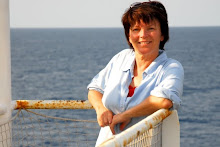1139 FOOD FOR LIFE
Hevie, Benin, West Africa, has been the heart of darkness for generations because of the voodoo religion that permeates life there. But the Light is now shining in Hevie, thanks to ‘Food for Life’, the agricultural development program started in 2009 by Mercy Ships and Bethesda of Benin, a non-government organization (NGO). This program is preparing leaders in Scripturally-based, organic farming methods, who can train others to be trainers, too. This easily duplicatable process aims to transform the growing of food supplies in the area, as it lifts the economic status of those involved.
The program has accomplished much in its first year, even the construction of the Bethesda Food for Life Training Center, with funding from Mercy Ships. The Center is made up of dorm rooms for students and a central classroom for training.
During the current field service in Togo, the program is partnering with three NGOs:
Centre pour l’Ecologie et le Developpment in Danyi; IIFEG – Ecole de l’Enterprise in Lome; and Association Developpment Avenir ONG d’appui au Developpment in Lome. Staff members from these NGOs have learned the biblical concepts of agriculture during their four-month training program, and have used the methods to grow crops in their own gardens at the Center. They will now become trainers for each NGO, teaching the Scriptural concepts to their trainees.
The Togo partnerships have built lasting friendships during their training which may form the basis of a Western Africa agricultural network. Such a network would be a “tremendous asset in developing like-minded agriculturists in Western Africa that will train up a new generation of farmers,” said Ken Winebark, Mercy Ships Agriculture Program Administrator. Equipping trainees and partners with skills and philosophy is a strong supporting mechanism that will help them to continue the teaching program after the Africa Mercy leaves Togo.
Scriptural methods of agriculture have proven to be far superior to traditional African methods. The gardens of the trainees now completing their training in Benin are of superior quality to the crops of surrounding farms. The vegetables are bigger, greener and better developed that those grown a few hundred feet away. In addition, the crops were planted two weeks later than the nearby farms. This fact has stirred much interest in the program among those in the area, who are driving through the property just to take a look.
The Biblical farming practices seek to use the land in the way God intended, using the nutrients already present in the trees whose leaves breakdown and replenish the soil with their nutrients. In this way, seeds can be planted in the same stations during the next planting season.
The traditional African farming practice is to ‘slash and burn’ the land. Everything is cut down and the land is totally cleared and burned. This destroys the land, kills the microorganisms, encourages erosion, leaves it open to the elements, and destroys the organic matter that is present for the next crop. The biblical practice is to clear the land, but instead of burning, the soil is covered with a thick coat of organic mulch. This provides nutrients for the growing crop, protects from water and wind erosion, retains the moisture, and decreases the need for weeding. Keeping soil tillage to a minimum helps the root systems to hold the soil in place and prevents micro organisms from being destroyed. The Food for Life program, which seeks to maintain a strong and healthy environment and avoid pollution, provides a sustainable agriculture that is not dependent on harsh chemicals and expensive fertilizers.
The Director of Food for Life Bethesda, Urbain Lontchedji, said, “The program is good because people are starting to do something. …they are serious and have a will to prosper.”
According to Jean-Claude Mouditou, Mercy Ships Agriculture Program Facilitator, the program is promoted by radio ads and through Christian radio and churches. But it’s not strictly a Christian program. “We want everyone who has a need,” he said. “It glorifies God that we don’t limit the program to Christians. We want everyone who has a need.”
Information about the program is also offered at Bethesda’s many offices all over the county. Applicants are interviewed and twenty are chosen. This year, trainees were accepted from Togo. “If people have motivation and want to learn, we want them. Most are already farmers and have a deep desire to learn,.” said Mouditou.
The program is free of charge currently. Mercy Ships supplies all the meals for trainees, seeds, light and tools.
After completing the program, leaders meet with trainees once a month for follow-up, to see what everyone is doing and what they might need. Relationship is used to encourage each other, share problems and work with the inexperienced.
Mouditou added, “I am very excited to see what God is doing for our students. He has given them many opportunities to do agriculture and teach many, many others the things they learn. I am so blessed to see that.”
Tuesday, June 1, 2010
Subscribe to:
Post Comments (Atom)










































No comments:
Post a Comment
Note: Only a member of this blog may post a comment.